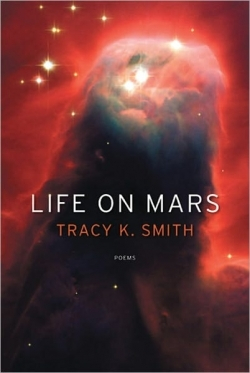Life on Mars
It is as alien as one might suppose, Life On Mars, and yet there are familiarities—David Bowie, head cocked; Universal Studios, prolific as ever. In her third collection of poetry, Tracy K. Smith, takes us on a cinematic journey to the ends of the galaxy. Her collection begins at the end—of history and space, Earth and humanity—a sweeping panorama. Slowly she pulls in, frame by frame, to the present, the near past, the life of her father, deceased, the neighbors, her lover taking the dog for a walk, until she is as near to a thing as can be, the life growing inside her—a world fantastic as Mars, “The room is red, like ourselves /on the inside.” Her poems traverse dark matter—the soul, god, cruelty—a journey lit by stars.
In her expansive and exquisitely spun poem, “My God It’s Full of Stars,” Smith interposes cosmic stellar light with Hollywood film stars—the pictures captured by the Hubble Telescope with those of the silver screen; Stan Kubrick’s 2001; the films of Charlton Heston; zombie movies—it is as if we are looking through the kind of telescope that uses mirrors. She sets the stage in the first line: “We like to think of it as parallel to what we know.” She leaps through the parallels, and when she sets down for a moment in concrete time and place, even the president is a Hollywood actor: “These were the Reagan years, / When we lived with our finger on The Button and struggled / To view our enemies as children.” Despite these familiarities, the poems throughout this collection orbit around what we don’t know—what is out there, beyond us, between us, and after.
Like the best films, Smith’s “camera work” is smooth and unobtrusive. Her language moves with ease, its artifice covert, the use of form is deft and subtle, the sounds—a mirthful tumbling in the mouth. Many of her poems are studded with a wry humor—“It & Co,” “The Universe is a House Party.” In “The Universe as a Primordial Scream,” the poet wonders why the children one floor up are permitted to make such a galactic racket every morning. She speculates “Whether it is merely an experiment / Their parents have been conducting / Upon the good crystal, which must surely / Lie shattered to dust on the floor.”
A protégé in the Rolex Mentor and Protégé Arts Initiative and a member of the Creative Writing Faculty at Princeton University, Tracy K. Smith, is no stranger to awards; her work has been published widely. This latest work is an elegant exploration of a metaphysical universe beyond what can be known and the strange wonder of life as we know it.
Reviewed by
Jen Steinnorth
Disclosure: This article is not an endorsement, but a review. The publisher of this book provided free copies of the book to have their book reviewed by a professional reviewer. No fee was paid by the publisher for this review. Foreword Reviews only recommends books that we love. Foreword Magazine, Inc. is disclosing this in accordance with the Federal Trade Commission’s 16 CFR, Part 255.

